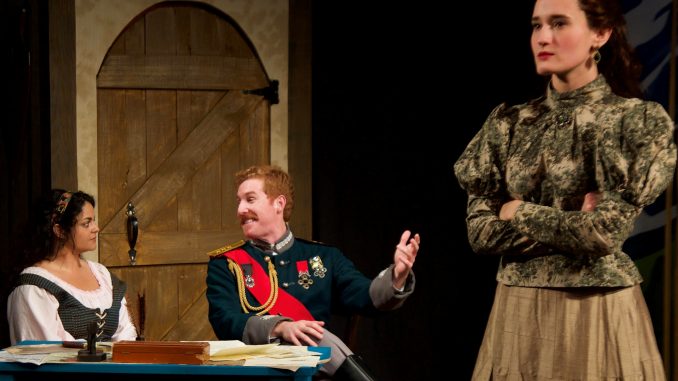
In the cozy space on the second floor of the Edgewater Presbyterian Church, a set portrays another cozy space, the bedchambers of a well-read Bulgarian heiress named Raina Petkoff with a penchant for the theatrical. The windows open up to a world at war, and Raina stands on the balcony, as any good heroine with a penchant for theatrics would do. When told to close said window against the threat of shooting, she makes her stand, defying the world and the thrill of war to come to her doorstep… and after Raina’s mother departs, her servant Louka informs her, a bit disdainfully, that the bolt of one of the shutters is missing and the window can simply be pushed open any time for any reason.

And then the window is indeed pushed open and the war enters in the form of a pragmatic Swiss mercenary Captain Blunschli, who disrupts Raina’s notions of battle and love in City Lit’s equally brainy and silly season opener, George Bernard Shaw’s Arms and the Man. The laughs begin shortly after Blunschli bursts into Raina’s bedchamber and by Act II they are rolling, the cast growing confident as peacetime makes for strange bedfellows and the secrets and lies of the character compound.
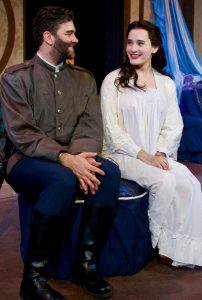
Photo by Steve Graue
The cast all seem to relish the wordplay as much as the sometimes contrary relationships they have to create. Director Brian Pastor’s first scene of Raina and Blunschli almost has the appearance of watching water molecules boil: the attraction and repulsion is shown in the action as the two alternately huddle together, then bounce apart, trading words about heroism, the opera, and chocolate. Scottie Caldwell is charming as Raina, letting uncertainty and attraction war in her eyes as she makes certain pronouncements about her future and her notions about life, and she has a willing, wonderful stage partner in Adam Benjamin, who lets the steady, practical soldier-for-hire show through even in the early moments of frantic scramble.

Equally delightful is the chemistry Benjamin exhibits with the immensely game Martin Diaz-Valdes as the grand but faulty Sergius Saranoff, Raina’s betrothed who never seems comfortable unless he is posing as though his portrait is being painted and who will not apologize but will spin headily into a blustering self-reprimand, stomping around in circles as though pursued by his failings. Pastor’s staging reverses itself in Act II when Saranoff challenges Blunschli to a duel. As Diaz-Valdes snaps back and forth to Benjamin as on a tether, alternately frustrated and relieved as Blunschli sits calmly at a desk composing correspondence. Diaz-Valdes’ willingness to lean into Sergius’ folly and cluelessness without losing sight of his humanity makes his deadpan, confused reactions as the play reaches its pinnacle all the funnier.
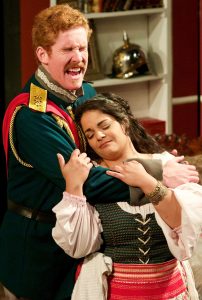
The other players in the love tangle are headstrong, resentful Louka (Chelsee Carter) and content, patient Nicola (Linsey Falls), the Petkoffs’ servants. Carter strikes the tart balance between showing Louka’s discontentment and disrespect with her wounded heart and pride, and Falls exits and enters scenes with great comedic panache, and their tense scenes together as individuals heading towards marriage with entirely different notions of partnership and life are a sharp contrast to Benjamin and Caldwell’s magnetism. Completing the marital set are Raina’s parents, Peter and Catherine, a career military man who devolves (or perhaps always is) into an order-taking private when in the presence of his masterful wife Catherine. Adam Bitterman’s Peter is all booming confidence as he returns home, showing the erosion of his certainty with each passing scene, trading swagger for a sort of foggy befuddlement as the major begins to realize he is only ever in charge when war is raging; likewise, Eleanor Katz’s Catherine grows more assertive, installing an electric bell and maneuvering Nicola into gaslighting her husband regarding a beloved housecoat. Their partnership, Louka tells us, is also full of secrets, but Bitterman and Katz show the loving marriage built on a foundation of knowing exactly who the other party is.
Though Shaw called it an anti-romantic comedy, Arms and the Man has a heart at the middle of it, and this City Lit production lets it beat, going so far as to choreograph a moment when nearly all of the characters hold their hands to their chest in a sign of syncopated mutual warmed hearts. It’s not an exaggeration to say that several audience members extemporaneously joined them. This is a production that finds the perfect balance of the cerebral and the emotional within Shaw’s words.
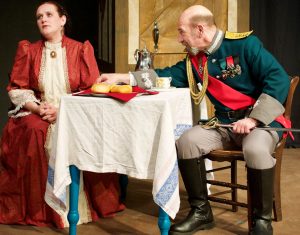
Regular run Sunday, September 16 through Sunday, October 21 (Fridays and Saturdays at 7:30 pm, Sundays at 3:00 pm). Single tickets priced at $32 for regular performances are on sale now at the citylit website.


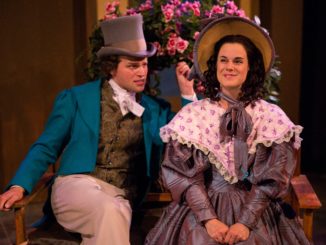
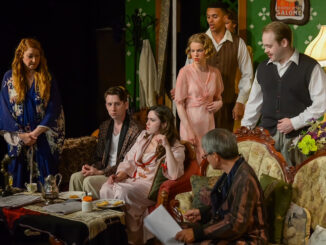
Be the first to comment